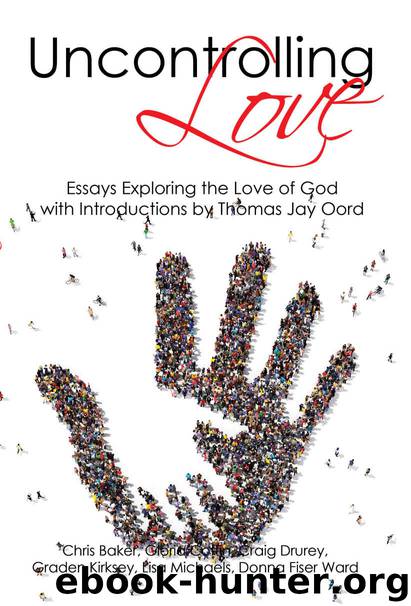Uncontrolling Love: Essays Exploring the Love of God by Michaels Lisa & Drurey Craig & Baker Chris & Coffin Gloria & Fiser Ward Donna & Kirksey Graden

Author:Michaels, Lisa & Drurey, Craig & Baker, Chris & Coffin, Gloria & Fiser Ward, Donna & Kirksey, Graden
Language: eng
Format: epub
Publisher: SacraSage Press
Published: 2017-08-06T04:00:00+00:00
2. Gen. 2:16-17
3. Ibid.
4. I Cor. 15:22
5. John 15:13
6. I John 4:8
7. Rom. 12:5
8. I Pet. 1:18-19
9. John 3:16
10. Gen. 2:17
11. Gen. 3:5
12. Rom. 8:28
The Kenotic Creation: A Universe of Moral Choice
F. Jerry Josties
The excessive abstraction in physics/science that began with Galileo, measurement, and the primary-secondary quality distinction, was explicitly intended to separate science and theology. This essay is an adventure in poetic theological metaphysics that hopefully will inspire others to achieve a deeply beautiful reconciliation between science and theology by interpreting scientific abstraction in terms of fully meaningful moral choice in a world view that can be called panentheistic panpsychism.
I’ve been thinking about how the creation story should be told if God’s creative Love is truly uncontrolling. If I were telling this story, here’s what I might say . . .
In the beginning, God, as Infinite Love, gave of Himself (kenosis) so completely that the creation experienced infinite freedom. This freedom is so complete that potential identities could choose whether or not to come into existence as egos partially separate from God. These creatures would be only partially separate from God, because they exist entirely within Infinite Love. How could particles that do not yet exist make a choice? In order to tell a creation story, it is necessary to have a prior, deeper understanding of time. In this story both space and time are the result of free moral choice.
Those who chose to exist became the smallest elementary particles. Those who chose to remain with God became the elements of empty space—identities that might have been.
The deep underlying meaning of the space of the initial particles is the initial kenosis of God. And subsequent kenosis of particles gives additional space/freedom to other particles. Space is due to kenosis, or the choice for other. The expansion of the universe is then seen as the contraction of ego, correlating with the emergence of higher levels of identity (see below).
The deep underlying meaning of what we call the ‘flow of time’ is also due to free choice, the choice for ego/self. This is because these choices in general cannot be anticipated, so that the resulting events can only be considered and experienced in an essential sequence, which is the meaning of ‘time.’ The choice for other may be considered the default anticipation, and then might not contribute to ‘time.’
So the kenosis of God is the origin of moral choice. Such choices were required in every subsequent encounter, so all events/encounters had outcomes dependent on a double binary choice. That double binary choice was between self and other and made by both identities in the encounter.
The creaturely choice for the other is a kenotic choice. In this, creatures mimic the choice made by God in creating. The kenotic choice brings one back at least to a partial reunion with God. In acting like God, we merge or reconnect with Him. This is why the moral choice for other ‘feels good.’ It is in itself a degree of existential completion.
All motions by selves/egos and all assertions of freedom (choices for self/ego) require empty space.
Download
This site does not store any files on its server. We only index and link to content provided by other sites. Please contact the content providers to delete copyright contents if any and email us, we'll remove relevant links or contents immediately.
The Lost Art of Listening by Michael P. Nichols(7494)
Why I Am Not A Calvinist by Dr. Peter S. Ruckman(4149)
The Rosicrucians by Christopher McIntosh(3513)
Wicca: a guide for the solitary practitioner by Scott Cunningham(3167)
Signature in the Cell: DNA and the Evidence for Intelligent Design by Stephen C. Meyer(3132)
Real Sex by Lauren F. Winner(3014)
The Holy Spirit by Billy Graham(2944)
To Light a Sacred Flame by Silver RavenWolf(2814)
The End of Faith by Sam Harris(2733)
The Gnostic Gospels by Pagels Elaine(2527)
Waking Up by Sam Harris(2454)
Nine Parts of Desire by Geraldine Brooks(2361)
Jesus by Paul Johnson(2352)
Devil, The by Almond Philip C(2325)
The God delusion by Richard Dawkins(2305)
Heavens on Earth by Michael Shermer(2278)
Kundalini by Gopi Krishna(2180)
Chosen by God by R. C. Sproul(2161)
The Nature of Consciousness by Rupert Spira(2104)
